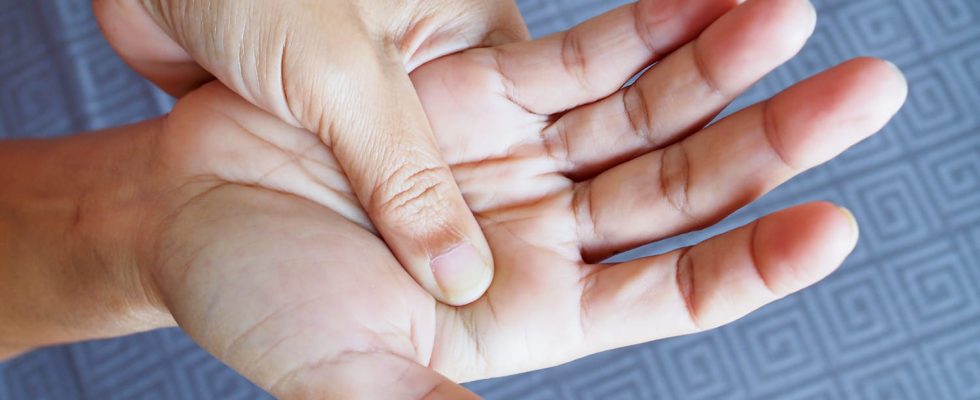Having tingling in the hands (paresthesia) often results from too prolonged support at the level of the arm. But other causes are possible: diseases, deficiencies, early sign of stroke…
Tingling is an expression ofparesthesia: a touch disorder that includes tingling, numbness and tingling in a limb, usually in the hands, fingers, sometimes the legs or face. What are possible causes tingling in the limbs? A sickness ? A lack ? A bad position? A sign of stroke?
1. Carpal tunnel syndrome
Apart from minor tingling due to poor support or positioning, the most common cause is carpal tunnel syndrome: the compression of the median nerve at the level of the wrist causes these sensations of numbness and tingling, especially during the night or in the morning upon waking. These disorders may be accompanied by weakness in the wrist or hand. This syndrome most often appears following repetitive gestures, carried out in a professional environment. “Carpal tunnel isn’t the only one causing these symptoms: compression of the ulnar canal, at the level of the elbowcan also cause tingling in the hands“, emphasizes Doctor Handschuh, general practitioner.
2. Diabetes
Note that people with diabetes, at a relatively advanced stage of the disease, are also affected by the appearance of tingling: we speak of “diabetic neuropathy”, due to high levels of sugar and fat in the blood, which damage nerve endings. “However, the tingling appears in this case most often in the legs and feet, more rarely in the hands.“, says the doctor.
3. Spasmophilia
An attack of spasmophilia can also cause tingling in the hands. Other characteristic symptoms then appear: anxious state, muscle spasms, accelerated breathing…
4. An early sign of a stroke
If these tingling sounds more like a form of numbness, weakness in the hands, they may suggest a warning sign of a stroke“in particular if the person concerned is one of the people said to be at risk (known vascular problems, hypertension, cholesterol, etc.)”, adds Doctor Handschuh.
5. Raynaud’s disease
Raynaud’s disease is a chronic blood circulation disorder that affects the extremities (fingers, toes, nose and ears). It manifests itself in crises, during which fingers turn white and cold, then blue and finally red and swollen. These seizures also cause hand numbness and tingling.
6. Multiple sclerosis
Multiple sclerosis is a common cause of paresthesia, due toinflammation of the spinal cord. Numbness can affect the hands but also the legs, and be accompanied by a decrease in visual acuity, incontinence, fatigue and balance disorders.
7. Vitamin B12 deficiency
Vitamin B12 deficiency, a disorder that mainly affects alcoholics and the elderly, can also cause nerve pain and therefore tingling in the hands. In addition, these tingling may reflect an underlying pathology, such as multiple sclerosis (which affects the central nervous system).
8. Poor posture at work
Having a chronically numb hand can be the result of repetitive tasks or awkward posture in a work setting. computer work, poor mouse griptension in the head and spine, use of vibrating tools are all possible causes of numbness in one or both hands.
9. A bad position while sleeping
When first felt on waking, numbness in one hand may be due to the position adopted while sleeping. These occasional tingling in the limbs are not serious and subside spontaneously.
When to consult and what treatment?
If the tingling tends to be repeated frequently, if it becomes more intense and the area concerned enlarges, it is recommended to consult a doctor who, if necessary, will redirect you to a neurologist for further examinations. If the tingling comes on suddenly and is accompanied by other symptoms such as speech impediment, weakness on one side of the body, loss of balance and/or visual disturbance, it is can be a sign of a transient ischemic attack (TIA) or stroke: you must then contact the emergency services as soon as possible. In the event of a simple numb limb, the movement of the latter is enough to make the tingling disappear. If carpal tunnel syndrome is confirmed, spontaneous healing can sometimes be observed, especially by correcting risky postures. Otherwise, surgery is considered.
Thanks to Doctor Handschuh, general practitioner.
